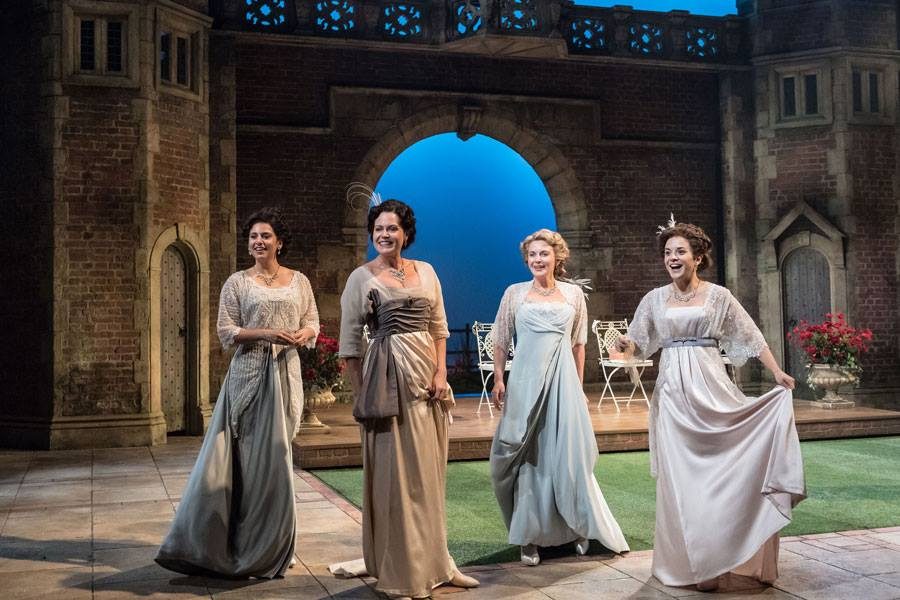Love’s Labour’s Lost and Much Ado About Nothing at Theatre Royal Haymarket

Best known for his tragedies, and plays heavy with romance, murder and politics, it’s perhaps easy to forget Shakespeare was as much a comedian as he was a writer of great plots and poetry. And if anyone is here to remind of us of that, it’s the prestigious Royal Shakespeare Company, hitting London with a double bill of the playwright’s finest comedies, seen as never before.
What makes director Christopher Luscombe’s production unique is he set the two plays back to back in the same World War One-era English country house. Love’s Labour’s Lost is transplanted to the carefree English summer of 1914, complete with Edwardian gowns and bowls on lawns. A King and his court’s men, despite having taken an oath to do nothing but study for three years, find themselves quite taken with an elegant French princess and her ladies-in-waiting. The two quartets form teams in a battle of wits and bad poetry as the men try to woo the objects of their affections and the women find ways to have fun at their admirers’ expense. In an abrupt and somewhat unresolved ending, the men vow to take on an extended period of hardship before returning to their partners. Much Ado About Nothing then picks up in the winter of 1918, with war-weary soldiers returning to England to restart their lives and rekindle romances, with the scenes and sounds of the brewing 20s as a rich backdrop. A malicious plot attempts to thwart the joining of soldier Claudio and young Hero. But the real focus is the adversarial turned affectionate relationship between Benedick and sharp-tongued Beatrice.
With the quality one has come to expect from the Company, the two plays are executed to the highest standard in form and substance. By presenting the stories in the context of pre- and post-War Britain, Much Ado becomes a kind of sequel and resolution for the dalliances in love we see in Love’s Labour’s Lost, while Luscombe has some fun with the aesthetic and music of the evolving era to illuminate Shakespeare’s words and characters. Mechanised set pieces from Simon Higlett move the action effortlessly from libraries to moonlit rooftops, from luxurious reception rooms to church interiors. Immaculate floor length silk dresses and cusp of the roaring 20s low slung frocks, accompanied by an original live score by Nigel Hess, conjure the distinct eras. The choreography of movement is also crucial to the comic effect: the four ladies in Love’s Labour’s Lost whipping round their silk trains as they pace the stage, plotting their next caper; Benedick “secretly” eavesdropping on a conversation about Beatrice with his “floating” head stuck out the Christmas tree he hides behind in Much Ado.
It’s a strong ensemble and especially impressive to see the double-up of characters as they move from one play to the next. John Hodgkinson has some un-PC fun with Shakespeare’s take on a Spanish accent and holds gravitas as Don Pedro. Tunji Kasim is hilarious as a teddy-hugging, love-sick Dumaine and impressive as a mistrusting Claudio, while Rebecca Collingwood is a stunning Katharine and wronged, virginal Hero. Nick Haverson makes his mark as Costard and the malaprop-ridden constable Dogberry but perhaps overdoes it a little as he demolishes the scene of the interior of the police station with some unruly slapstick. But it’s the verbal-duelling pair Lisa Dillon and Edward Bennett who steal the show – Bennett owns the stage as a beaming Berowne and side-splitting Benedick, and Dillon is exceptional as a relentlessly witty Beatrice, reminding us that Shakespeare gave us female characters who could give as good as they got, if not more. Both particularly shine as a duo in Much Ado About Nothing, fully embodying their respective characters with buckets of personality and generating an infectious onstage chemistry through their flirtatious banter: “There’s a skirmish of wit between them.”
Whether or not Much Ado About Nothing was ever intended as a sequel (or as some would have it previously called Love’s Labour’s Won) the Royal Shakespeare Company’s presentation of the texts as an extended double bill straddling the Great War serves to reimagine the stories’ characters and varying representations of love in poignant and hilarious ways. Nailing the best of the Bard’s banter, each play is excellent enjoyed alone but even better accompanied by the other, Dillon and Bennett finally quashing their comic quarrelling with a much anticipated (by characters, cast and audience) kiss.
Sarah Bradbury
Photos: Manuel Harlan
Love’s Labour’s Lost and Much Ado About Nothing are at Theatre Royal Haymarket from 9th December 2016 until 18th March 2017.
Book your tickets for Love’s Labour’s Lost here.
Book your tickets for Much Ado About Nothing here.
Watch the trailer for Love’s Labour’s Lost and Much Ado About Nothing here:
























Facebook
Twitter
Instagram
YouTube
RSS